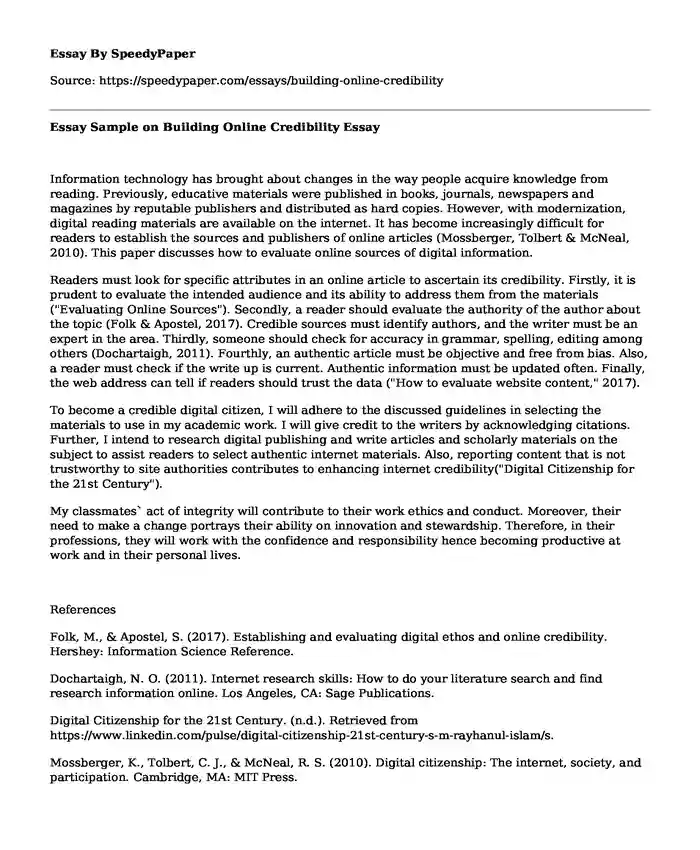
| Type of paper: | Dissertation |
| Categories: | Internet Information technologies |
| Pages: | 2 |
| Wordcount: | 441 words |
Information technology has brought about changes in the way people acquire knowledge from reading. Previously, educative materials were published in books, journals, newspapers and magazines by reputable publishers and distributed as hard copies. However, with modernization, digital reading materials are available on the internet. It has become increasingly difficult for readers to establish the sources and publishers of online articles (Mossberger, Tolbert & McNeal, 2010). This paper discusses how to evaluate online sources of digital information.
Readers must look for specific attributes in an online article to ascertain its credibility. Firstly, it is prudent to evaluate the intended audience and its ability to address them from the materials ("Evaluating Online Sources"). Secondly, a reader should evaluate the authority of the author about the topic (Folk & Apostel, 2017). Credible sources must identify authors, and the writer must be an expert in the area. Thirdly, someone should check for accuracy in grammar, spelling, editing among others (Dochartaigh, 2011). Fourthly, an authentic article must be objective and free from bias. Also, a reader must check if the write up is current. Authentic information must be updated often. Finally, the web address can tell if readers should trust the data ("How to evaluate website content," 2017).
To become a credible digital citizen, I will adhere to the discussed guidelines in selecting the materials to use in my academic work. I will give credit to the writers by acknowledging citations. Further, I intend to research digital publishing and write articles and scholarly materials on the subject to assist readers to select authentic internet materials. Also, reporting content that is not trustworthy to site authorities contributes to enhancing internet credibility("Digital Citizenship for the 21st Century").
My classmates` act of integrity will contribute to their work ethics and conduct. Moreover, their need to make a change portrays their ability on innovation and stewardship. Therefore, in their professions, they will work with the confidence and responsibility hence becoming productive at work and in their personal lives.
References
Folk, M., & Apostel, S. (2017). Establishing and evaluating digital ethos and online credibility. Hershey: Information Science Reference.
Dochartaigh, N. O. (2011). Internet research skills: How to do your literature search and find research information online. Los Angeles, CA: Sage Publications.
Digital Citizenship for the 21st Century. (n.d.). Retrieved from https://www.linkedin.com/pulse/digital-citizenship-21st-century-s-m-rayhanul-islam/s.
Mossberger, K., Tolbert, C. J., & McNeal, R. S. (2010). Digital citizenship: The internet, society, and participation. Cambridge, MA: MIT Press.
Evaluating Online Sources. (n.d.). Retrieved from https://library.columbia.edu/locations/undergraduate/evaluating_web.html
How to evaluate website content. (2017, July 04). Retrieved from https://www.ed.ac.uk/information-services/library-museum-gallery/finding-resources/library-databases/databases-overview/evaluating-websites
Cite this page
Essay Sample on Building Online Credibility. (2022, Sep 12). Retrieved from https://speedypaper.net/essays/building-online-credibility
Request Removal
If you are the original author of this essay and no longer wish to have it published on the SpeedyPaper website, please click below to request its removal:
- Comparison Essay Example: the Books The War of the Worlds and World War Z
- Essay Example: Relationship to Language
- Post #1: Diverse Teams
- Generalized Anxiety Disorder: The Case of Alice, Free Essay
- Free Essay in Public Health: Basic Biostatistics: Articles Finding
- Analysis Essay Sample on 1984 by George Orwell
- Paper Example. A Debate Over Strategy
Popular categories




